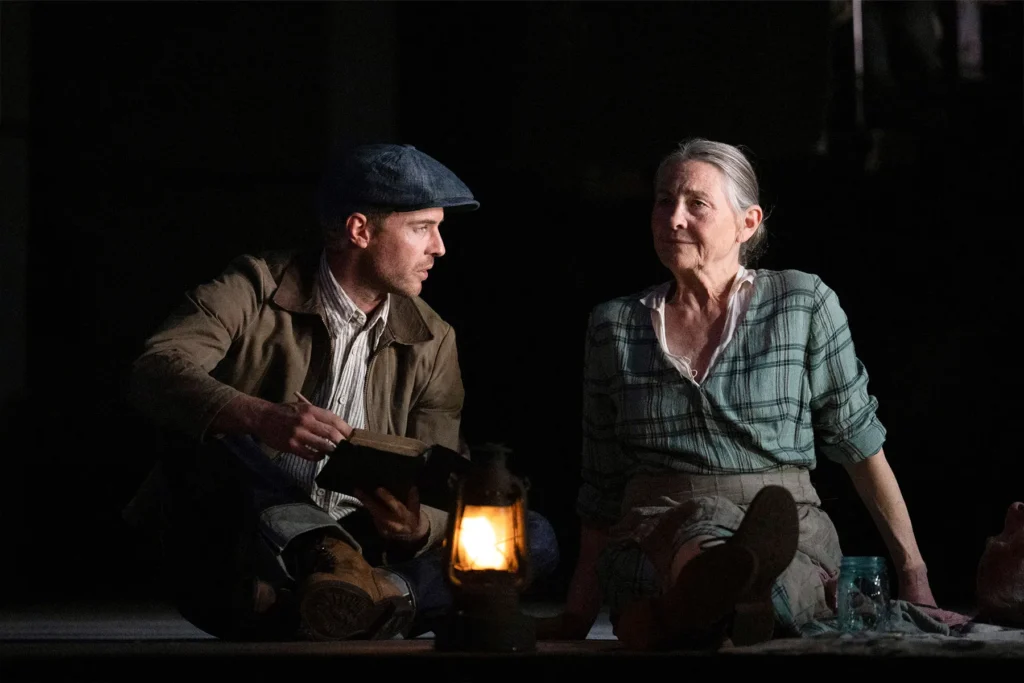
The theme of London theatre in 2024 continues with another opening that boasts big names but ultimately underwhelms. We’ve had Tom Holland in Romeo & Juliet, Dominic West in A View from the Bridge, Kit Harrington and Olivia Washington in Slave Play, Ian McKellen in Player Kings, Brian Cox and Patricia Clarkson in Long Day’s Journey Into Night, Ben Whishaw and Emma D’Arcy in Bluets, Sheridan Smith in Opening Night and a whole host of talent from Fiona Shaw to Emilia Clarke in ECHO – all promising a good time and under-delivering (even if I personally disagreed with the more widespread negative takes on Bluets).
We did have the widely acclaimed A Picture of Dorian Gray starring Sarah Snook early in the year and Imelda Staunton’s star turn in Hello, Dolly! promised a course correction for star-casting last week, but alas, The Grapes of Wrath, boasting Snook’s Succession co-star Cherry Jones opposite Harry Treadaway, sees us fall back into middling territory.
A reproduction of a dust storm at the play’s opening promises us a dark, moody take on John Steinbeck’s 1939 novel that traces the Joad family’s journey from Oklahoma in the Dust Bowl to California to seek a new life and employment following the repossession of their home and land by a bank during the Great Depression. What we get instead is an opening half in which very little really happens other than exposition – even with the family covering 2,000 miles across the United States in a Jalopy in the process.

We rarely get under the surface of the characters in Frank Galati’s adaptation which won the Tony Award for Best Play in 1990. Galati seemingly tried to squeeze all of the near-500 pages of Steinbeck’s tome into the play so that despite being almost 3 hours long it feels like we move at breakneck speed through their story: the Joads are at a camp they don’t like, now they’re approaching the long journey across the desert, now they’re made it across the desert, now they’re in another camp they do like, now they’re in a camp they don’t like, now they’re in another camp they don’t like. You get the idea.
It means we get little sense of the characters or their development. For example, Tom Joad’s (Treadaway) revelation that he must go and fight against injustice, speaking the famous lines: “Wherever they’s a fight so hungry people can eat, I’ll be there” comes entirely from the blue. It also means that, despite the pace at which Carrie Cracknell’s production whizzes through the play’s events, it becomes a little bit of a slog – albeit, less so in the more dramatic final quarter.
Interestingly, the production struggles to convey the hardship of the time. The people talk about being hungry or not having eaten for two days but it doesn’t seem real. This feels largely because of what I might describe as the ‘cleanness’ of Alex Eales’ set design and Evie Gurney’s costume design. It’s all very bleak, aided by Guy Hoare’s mood lighting, but it doesn’t feel authentically so.

At times you would be forgiven for being mistaken this wasn’t some form of dystopian other world from a production of King Lear. Maybe Cracknell is trying to strip away some of the setting so we can more easily make parallels to the present day. Maybe. The problem is probably also due to the failure of the actors to take us to a place where we can suspend our disbelief that these are all hungry people who don’t know where or when their next is coming from.
Still, there are good performances here – Jones, Treadaway and Greg Hicks all make a case for their leading roles, but they do find themselves blocked from truly shining the material and the production. The acting roles are supplemented by a four-piece band, led by Maimuna Memon whose original songs are interspersed between scenes. Whatever the intention of their inclusion, there is a feeling of the play being dragged out further – unnecessarily so.
That all sounds quite negative – but it’s not bad, it’s mostly just incredibly frustrating because you know the production has the potential to be so much better. The saving grace is that the original story is strong enough that, despite the production’s flaws, there’s still something of worth here – Steinbeck’s rallying cry against injustice and oppression remains just as relevant today.
The Grapes of Wrath is at the National Theatre, London until 14 September 2024














